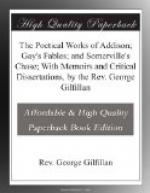As to his poetry, much of it is beneath criticism. His “Fables,” “Tales,” “Hobbinol, or Rural Games,” &c., have all in them poetical lines, but cannot, as a whole, be called poetry. He wrote some verses, entitled “Address to Addison,” on the latter purchasing an estate in Warwickshire (he gave his Countess L4000 in exchange for it). In this there are two lines which Dr Johnson highly commends, saying “They are written with the most exquisite delicacy of praise; they exhibit one of those happy strokes that are seldom attained.”—Here is this bepraised couplet:—
“When panting virtue her last efforts
made,
You brought your Clio to the virgin’s
aid.”
Clio, of course, refers to Addison’s signatures in the “Spectator,” consisting of the four letters composing the name of the Muse of History, used in alternation. We cannot coincide in Johnson’s encomium. The allusion is, we think, at once indecent and obscure; and what, after all, does it say, but that Addison’s papers aided the struggling cause of virtue?
In the same verses we find a fulsome and ridiculous preference of Addison to Shakspeare!
“In heaven he sings, on earth your
Muse supplies
The important loss, and heals our weeping
eyes;
Correctly great, she melts each flinty
heart,
With EQUAL GENIUS, but SUPERIOR ART.”
Surely the force of falsehood and flattery can go no further.
It is a pleasure to turn from these small and shallow things to the “Chase,” which, if not a great poem, is founded on a most poetical subject, and which, here and there, sparkles into fine fancy. Dr Johnson truly remarks, that Somerville “set a good example to men of his own class, by devoting a part of his time to elegant knowledge, and has shewn, by the subjects which his poetry has adorned, that it is practicable to be at once a skilful sportsman and a man of letters.” But besides this purpose to be the poet—and hitherto he has been almost the sole poet of the squirearchy, as considered apart from the aristocracy—Somerville has the merit of being inspired by a genuine love for the subject. He writes directly from the testimony of his own eyes, and the impulses of his own heart. He has obviously had the mould of his poem suggested by Thomson’s “Seasons,” but it is the mould only; the thoughts and feelings which are poured into it are his own. He loves the giddy ride over stock and stone, hedge and petty precipice; the invigoration which the keen breath of autumn or winter, like that of a sturdy veteran, gives the animal spirits; the animated aspect of the “assembled jockeyship of half a province;” the wild music of hounds, and horns, and hollas, vieing with each other in mirth and loudness; the breathless interest of the start; the emulous pant of the coursers; the excitement of the moment when the fox appears; the sweeping tumult of the pursuit; the dreamlike rapidity with which five-barred gates are cleared, the yellow




